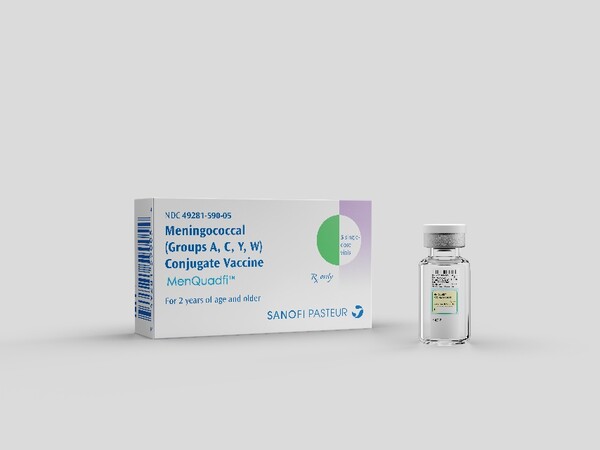Sanofi Pasteur Korea said it received marketing authorization from the Ministry of Food and Drug Safety (MFDS) for its invasive meningococcal vaccine, MenQuadfi (meningococcal (A, C, Y, W) polysaccharide-TT protein conjugate vaccine) on Wednesday last week.

MenQuadfi is a fully liquid vial quadrivalent meningococcal vaccine that protects against meningococcal serotypes A, C, W, and Y. It is licensed for a single dose for persons two to 55 years of age. MenQuadfi is administered as a single 0.5 ml intramuscular injection into the deltoid or anterolateral femoral region, depending on the recipient's age and muscle mass.
When evaluated for immunogenicity against existing meningococcal quadrivalent vaccines, MenQuadfi demonstrated non-inferiority against all four serotypes. For instance, seroprotection rates were 94.7 percent for serogroup A, 95.7 percent for serogroup C, 96.2 percent for serogroup W, and 98.8 percent for serogroup Y when immunized with MenQuadfi in people 10-55 years old, Sanofi Pasteur Korea said.
In addition, unlike Sanofi’s previous meningococcal vaccine, which utilized a diphtheria protein, MenQuadfi utilizes a tetanus protein and has an increased antigen dose (4 ug each of meningococcal serotype polysaccharide antigens A, C, W, and Y versus 10 ug each of meningococcal serotype polysaccharide antigens A, C, W, and Y).
Meningococcal infections prevented by MenQuadfi have been recognized as a significant public health problem worldwide. Meningococcal disease is a legal Class 2 infectious disease with a fatality rate of approximately 10-14 percent, affecting 500,000 people worldwide each year. Symptoms include headache, fever, neck stiffness, vomiting, and decreased consciousness, often accompanied by petechiae or erythema migrans. Some 11 to 19 percent of recovered patients may suffer from sequelae such as deafness, cognitive impairment, and neurological disorders, making it an important infection to prevent.
In particular, meningococcal infections are spread by droplets or direct contact, so vaccination is recommended for those about to enter a group setting. Examples include new military recruits and college freshmen living in dormitories. In addition, travelers and residents of high meningococcal endemic areas, such as Africa, and pilgrims to Mecca, Saudi Arabia, are also recommended for meningococcal vaccination. Other individuals with immune system disorders, such as complement deficiency, and those with anatomic or functional asplenia are also recommended for vaccination.
"We are pleased to be able to introduce a new meningococcal vaccine in Korea to protect vaccines aged two-55 years against meningococcal infection," Sanofi Pasteur Korea General Manager Pascal Robin said. "Meningococcal infection is a serious disease that can lead to sudden death, but it is highly preventable through immunization. In particular, we expect MenQuadfi to have a stronger preventive effect due to its improved immunogenicity compared to existing vaccines. We plan to expand the indication of MenQuadfi to infants and children under two years of age, and Sanofi remains committed to providing more options for preventing meningococcal infections."
Sanofi Pasteur has been developing meningococcal vaccines and campaigning to encourage immunization. The company has been working on meningococcal meningitis vaccines for 40 years, since 1974 when it supplied serotypes A and A+C vaccines to combat a meningitis epidemic in Brazil.
In Korea, the company partnered with the Korea Scout Association to educate more than 3,000 Korean delegates about the importance of meningococcal vaccination and encourage them to get immunized.
Related articles
- SK bioscience celebrates a decade of collaboration with Sanofi through expansion of vaccine plant
- Sanofi Korea expands Dupixent indication to address chronic nodular pruritic rash
- Sanofi-Aventis Korea GM elected as new chairperson of KRPIA
- Sanofi extends Eloctate’s expiration date after mislabeling controversy

